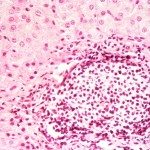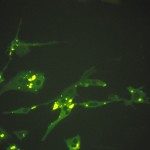Lien vers Pubmed [PMID] – 15220414
J. Virol. 2004 Jul;78(14):7410-7
We have developed a new strategy for antiviral peptide discovery by using lyssaviruses (rabies virus and rabies-related viruses) as models. Based on the mimicry of natural bioactive peptides, two genetically encoded combinatorial peptide libraries composed of intrinsically constrained peptides (coactamers) were designed. Proteomic knowledge concerning the functional network of interactions in the lyssavirus transcription-replication complex highlights the phosphoprotein (P) as a prime target for inhibitors of viral replication. We present an integrated, sequential drug discovery process for selection of peptides with antiviral activity directed against the P. Our approach combines (i). an exhaustive two-hybrid selection of peptides binding two phylogenetically divergent lyssavirus P’s, (ii). a functional analysis of protein interaction inhibition in a viral reverse genetic assay, coupled with a physical analysis of viral nucleoprotein-P complex by protein chip mass spectrometry, and (iii). an assay for inhibition of lyssavirus infection in mammalian cells. The validity of this strategy was demonstrated by the identification of four peptides exhibiting an efficient antiviral activity. Our work highlights the importance of P as a target in anti-rabies virus drug discovery. Furthermore, the screening strategy and the coactamer libraries presented in this report could be considered, respectively, a general target validation strategy and a potential source of biologically active peptides which could also help to design pharmacologically active peptide-mimicking molecules. The strategy described here is easily applicable to other pathogens.


